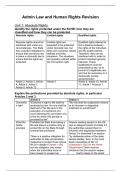Summary
Summary - Administrative Law and Human Rights (ULaw)
- Institution
- University Of Law (ULaw)
Summarises administrative law and human rights module by outlining foundational points within the subject and detailing different principles alongside relevant case law and legislation.
[Show more]





